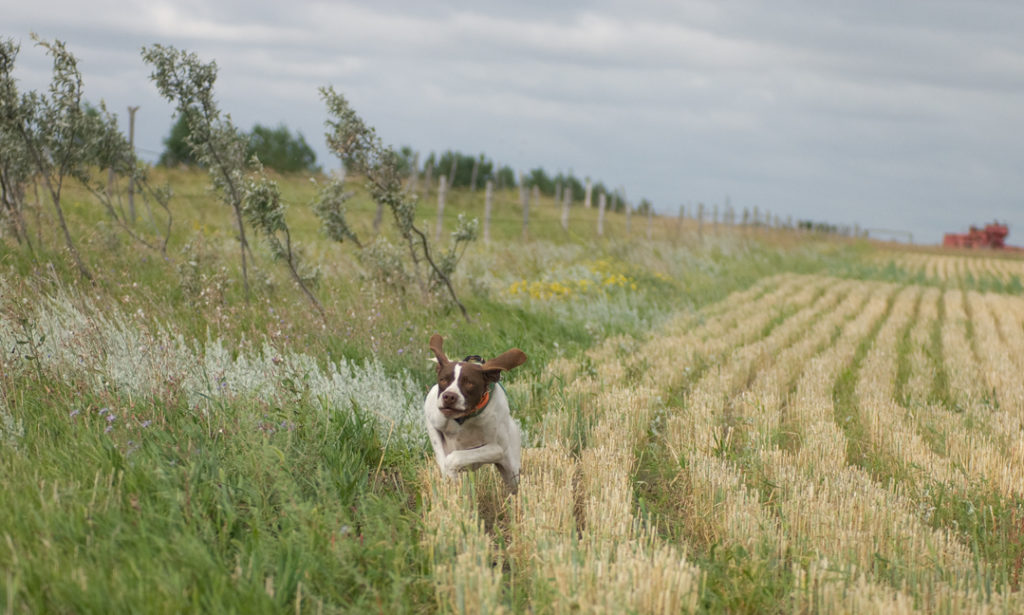Arleigh decided on a strategy for the remains of their summer. He would invite other handlers training nearby to come work with them for a day or two. It was a tradition in the game, gave the dogs a chance to hunt new ground, the handlers and help an opportunity to socialize and see how the competition’s prospects were coming along.
While he had only been roading Rampaging, which he planned to sell by the end of the prairie trials, he would show the dog to select handlers he figured had an owner willing to pay a good price. He had for sale also the three derby siblings of Rampaging and they were coming along pretty well. They were also teaching Bob about training.
Through the month of August Arleigh and Bob worked dog’s on their grounds with a dozen other handlers and their helpers. It was rewarding for them all, with Arleigh catching up with old friends (and fierce competitors) and Bob meeting the handlers and their helpers, often sons or daughters or neighboring farm boys from the handler’s home country, and seeing their dogs, mostly coming derbies like Rampaging’s siblings. By the end of August Arleigh knew he had three very good derbies, better than any brought by the invited handlers, and Bob had gained a world of good experiences, for each time one of their pupils was put down, the bracemate was from the string of a guest handler, and a head-to-head competition resulted.
For some, Arleigh handled and Bob scouted, but when a pupil assigned to Bob was down, Arleigh had Bob handle. Arleigh was amazed at how instinctively Bob sensed the way to guide his charge to seek the front and how responsive the dogs were to swing to Bob’s call when the course changed. He’s a natural bird dog man, Arleigh thought by the end of August.
Meanwhile, when not working dogs or doing chores, Bob was shooting hoops. When other young men were in camp he organized half-court games or “21” shooting contests.
Arleigh was amazed at Bob’s basketball talent, as well at his ability to make friends with all the youngsters who came with the invited handlers. These handlers in turn complimented Arleigh on Bob’s talent with dogs and good manners.
Oddly, the best derby in Arleigh’s string was not one of Rampaging’s siblings, but one of the plantation dogs brought to Arleigh the day before their departure from Leesburg. Arleigh knew nothing of its breeding, just that it had a super nose and great conformation and a floating gait. It was a female with liver mask and ears and the tell-tale liver spot at the set of its tail that said “Rebel.” It has been assigned to Bob.
Arleigh had decided they would attend only the back-to-back trials at Columbus that would begin right after Labor Day. He would enter Rampaging in the two all-age stakes and the three siblings plus the Rebel derby in the two derby stakes, and maybe one or two of the derbies in the all-age stakes as well. His goal was to sell Rampaging and his siblings at good prices. But before the drawing date came he had widened his goal.
Meanwhile the handlers he had invited to train with him were calling daily, trying to buy for their owners Rampaging and his derby siblings and the Rebel derby. Arleigh asked them questions about their owners and their backgrounds and interests and sources of wealth. The handlers thought he was doing so to assess the prices they might pay, but his purpose had to do with Bob’s future. His goals now had more to do with Bob than the dogs for sale, though the two were perhaps closely related.
Arleigh phoned the dog man on the plantation that had sent him the Rebel derby. He told him that the derby was more than a wagon dog, showed real all-age potential.
“I hoped that might be the case. I got her in a puppy trade, she’s by Funseeker’s Rebel,” the dog man said.
“Does Mr. Brown (owner of the plantation that had sent the Rebel derby) have an interest in trials?” Arleigh asked.
“A little. And I have been trying to increase that interest,” the plantation dog man said. (He had been a for-the-public handler before landing the job with Mr. Brown).
“Does Mr. Brown like basketball,” Arleigh asked next.
“Does he ever. He’s a UNC graduate and a big supporter of their program.”
Arleigh smiled. He already knew that Mr. Brown had a large fortune gathered in Silicon Valley, wherever that was. He’d bought his ten thousand acre plantation near Albany three years before when his Unicorn went public, whatever that meant. Arleigh knew this from Wikipedia (Bob had shown him on Arleigh’s smart phone).
Next day Arleigh called the dog man back.
“Why don’t you and Mr. Brown fly up here and see your Rebel derby compete. I guarantee she won’t disappoint you or him.” (Arleigh knew this was a reckless promise and that she might well disappoint, but this was time for a little salesmanship, he figured).
“I’ll give it a try.”
Arleigh decided to enter the Rebel derby in the two all-age stakes as well as the derby stakes. He would do the same for the best of the three Rampaging sibling derbies, the one Bob had trained.

Can’t wait to hear the rest
I am enjoying this story. Me being an old man myself can relate to the story.
I hope there is a part 3 and more.
Thank you,
Rod Champion
Part III and Part IV! 🙂